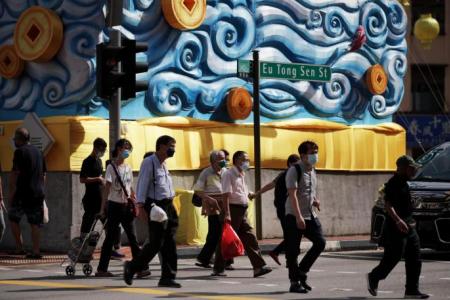Singapore must deal with current Omicron wave first before thinking of next steps
The co-chairs of Singapore's multi-ministry task force on Covid-19 have urged patience with the country's pandemic strategy, noting that an ongoing spate of infections caused by the Omicron strain would have to be arrested before any moves to relax measures or reopen borders could be considered.
Even then, with parts of the world remaining unvaccinated, one should expect continuing curveballs and question marks over how the coronavirus could mutate and morph into another variant, the three ministers added on Friday (Jan 21).
"Let's not get ahead of ourselves now, when we have not even reached the peak of the present wave," said Finance Minister Lawrence Wong.
He was speaking at a press conference held by the task force, where multiple questions were asked on Singapore's next steps after a current Omicron outbreak, with the variant making up about 70 per cent of daily cases - a proportion that could go up to 90 per cent.
The co-chairs said it was not possible to estimate the peak in terms of the number of infections; when this peak would arrive, or when it would subside and end.
But Singapore is undoubtedly in the midst of an exponential rise and will go through a process that other countries have - hitting a crest and then coming down at some point, said Mr Wong.
Health Minister Ong Ye Kung pointed to how South Africa, Britain and the United States took about four to six weeks for their Omicron cases to peak
"Omicron is so transmissible so when the numbers are so huge at some point, it runs out of people to infect and then it will start to come down," he explained. "But every country is different. Some have a lot of prior infections. They have different levels of vaccination."
Added Mr Wong: "We don't think it is prudent to relax or ease measures during this particular period....We don't know exactly what the impact will be on our healthcare system, or even on the broader issue of potentially a high rate of absenteeism and disruption of business operations. And that disruption can easily take place not just for businesses, but even for essential services including healthcare."
"Let's get through this wave first before we even think about the next bound," he said.
The minister noted the possibility that the virus could continue on its present trajectory, becoming milder and more like a flu - thus spelling a transition from pandemic to endemic.
"But it's too early to tell," he said. "So long as there are large segments of populations around the world remaining unvaccinated, the risk of mutation remains and you never know what the next variant will look like...There are still uncertainties for the rest of the year."
Fellow co-chair, Mr Ong, said that in the middle of a crisis with every variant unique in itself, the Government has to judge each situation and make decisions along the way.
He reiterated that Singapore has taken a "middle path" compared to countries either remaining closed with "zero-Covid" policies or eagerly opening up after each viral wave, only to throttle back restrictions.
"It's tiring, but on the other hand, we've made progress," said Mr Ong. He pointed to how Singapore had gone from imposing two-month circuit breaker restrictions in response to double-digit clusters in 2020, to implementing two-person group size limits to deal with the Delta variant surge last year.
"This year, with Omicron, we are quietly hopeful that we can go through this wave with the current posture, which I think allows most of us to carry on with our lives quite normally," said Mr Ong. "And after this wave, there's no doubt we will be even more resilient."
Trade and Industry Minister Gan Kim Yong said that with every wave and every variant, a bit more about the virus is understood and along with it, more tools to fight the pandemic.
"The key is to focus on getting our people vaccinated and boosted and at the same time observe the safe management measures that we've put in place to keep everyone safe as much as possible," he added.
He said the authorities understood that many Singaporeans were fatigued by the pandemic and its restrictions looming large for two years and counting.
"All of us are very eager to get to the end and hopefully reach endemicity soon," he said. "But I would advise that we have to exercise caution. We can't rush these things."
Read next - New VTL testing rules, suspension of hospital visits: Latest Covid-19 rules at a glance
Get The New Paper on your phone with the free TNP app. Download from the Apple App Store or Google Play Store now



